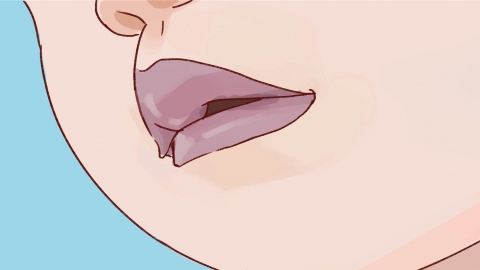What does it mean when your lips turn purple from getting angry?
Generally, purple lips caused by anger may be due to hyperventilation leading to respiratory alkalosis, vasoconstriction, anemia, bronchial asthma, chronic obstructive pulmonary disease (COPD), and other related causes. If you experience any discomfort, please seek medical attention promptly and undergo symptomatic treatment under the guidance of a qualified physician. Detailed explanations are as follows:

1. Hyperventilation Leading to Respiratory Alkalosis
During anger, individuals often hyperventilate, meaning their breathing rate and depth increase, causing excessive elimination of carbon dioxide from the body. This leads to a decrease in blood carbonic acid concentration and an increase in pH, causing respiratory alkalosis. This condition increases hemoglobin's affinity for oxygen, making it difficult for oxygen to be released to tissues, resulting in tissue hypoxia and thus causing purple lips. In daily life, one should strive to maintain emotional stability, avoid excessive excitement, and practice deep breathing when feeling emotionally agitated, inhaling and exhaling slowly to regulate breathing rate.
2. Vasoconstriction
Anger stimulates the sympathetic nervous system, causing peripheral vasoconstriction, including in the lips. After vasoconstriction, blood flow through the lips decreases, reducing relative blood oxygen content, which can cause purple lips. Daily attention should be paid to emotional regulation, stress can be relieved through exercise, listening to music, etc., the frequency of anger should be reduced, and exposure to cold environments should be avoided to prevent further vasoconstriction.
3. Anemia
Anemia is commonly caused by insufficient iron intake, chronic blood loss, or impaired hematopoietic function. In anemia, red blood cells and hemoglobin levels decrease, reducing the blood's oxygen-carrying capacity and leading to tissue hypoxia and purple lips. Symptoms such as pallor and dizziness may also occur. Patients may take medications such as ferrous sulfate tablets, ferrous fumarate granules, and folic acid tablets as advised by a physician.
4. Bronchial Asthma
Bronchial asthma is associated with genetic factors and environmental allergens such as pollen and dust mites. During an asthma attack, airway spasms and narrowing occur, leading to ventilation impairment and insufficient oxygen intake, resulting in purple lips. Symptoms such as wheezing and shortness of breath may also occur. Treatment may involve medications such as salbutamol sulfate tablets, terbutaline sulfate tablets, and montelukast sodium tablets, as directed by a physician.
5. Chronic Obstructive Pulmonary Disease
Chronic obstructive pulmonary disease is often caused by long-term smoking, air pollution, and recurrent respiratory infections. It may lead to impaired ventilation and gas exchange in the lungs, preventing oxygen from effectively entering the bloodstream and hindering carbon dioxide elimination, thereby reducing blood oxygen levels and causing purple lips. Symptoms such as coughing and sputum production may also be present. Treatment may involve medications such as salbutamol aerosol, budesonide suspension for inhalation, and salmeterol fluticasone propionate inhalation powder, as directed by a physician.
In daily life, maintaining good habits, moderate exercise, enhancing physical fitness, and improving cardiopulmonary function are recommended. Additionally, regular health check-ups should be conducted to detect and treat underlying diseases promptly, especially those affecting the cardiovascular and pulmonary systems and the blood.







